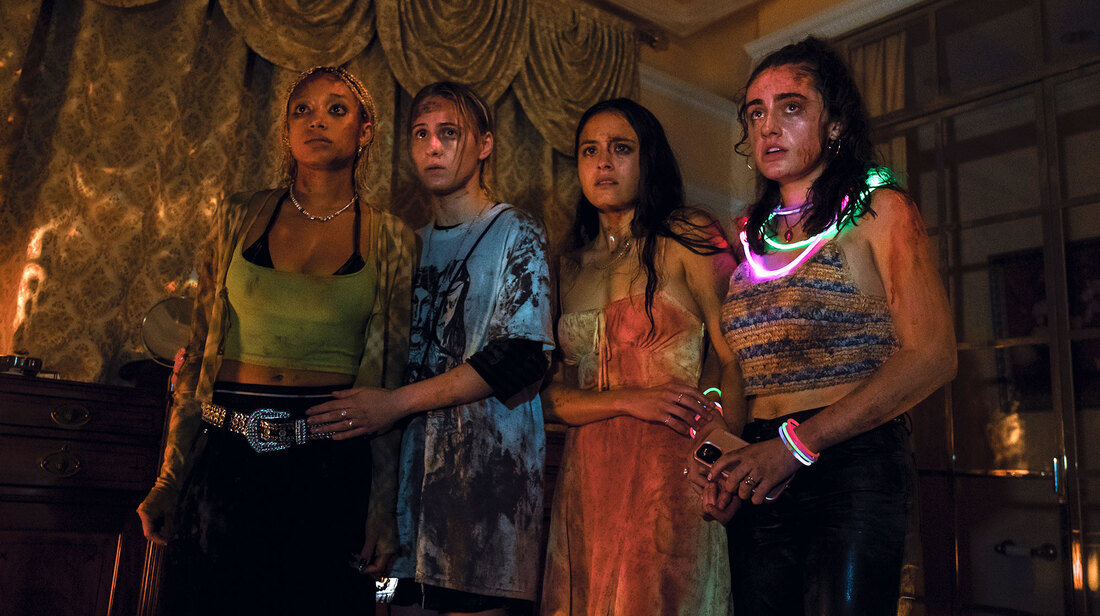|
By Nadia Dalimonte Christopher Abbott and Aubrey Plaza in Black Bear (2020) Cabin fever meets chaotic mind games in the wildly energetic film Black Bear, written and directed by Lawrence Michael Levine. This film ticks in mysterious ways…it maintains an erratic pulse that adds fuel to the disintegration of relationships. The story of Black Bear, much more puzzling and intricate than how it appears on the page, unravels in an insanely deconstructive way that sees characters in conflicting lights. Guiding the dense experimental nature of the film is a phenomenal performance by Aubrey Plaza. She takes you on a dysfunctional and intoxicating journey of a filmmaker who gathers influence from setting.
Black Bear follows Allison (Plaza), a filmmaker who seeks inspiration at a rural lake house, hoping an isolated setting would solve her writer’s block. But this remote retreat in the woods conjures up everything but peace of mind for her. Allison is a guest in these woods; Gabe (Christopher Abbott) and Blair (Sarah Gadon), the doomed couple who inherited the house, welcome her into their complex little world that Gabe especially manipulates. The film comes to life once the dynamics spark between the trio, particularly through snappy dialogue with a whole lot of subtext and even more shared tension. In the span of an evening, the characters are totally deconstructed as they each get confronted with truths about themselves. Given how quickly the tension rises, along with the heightened personal stakes each character has, one setback could set everything aflame. When we reach the breaking point, the film completely shifts gears and mutates into something else entirely. Levine breaks down these central characters and reveals them in a ‘behind the scenes’ light that is even more engaging than the first part of the film. The story feels very much like a puzzle, with each piece fitting into a bigger picture. What is the bigger picture of Black Bear? At the core, it’s about the making of an independent film in the woods. It’s about nightmarish ideas swirling around in Allison’s head and spilling out…somewhere. Levine leaves behind a lot of questions to chew on in terms of locating the blurred line between reality and imagination. With so much up for interpretation, there’s a lot to unpack and piece together. There’s also a great deal of trust that Levine puts into the audience to fill in the blanks. What keeps the lines blurred is an impressive attention to detail and a seamless transition between two very different halves of one film. The entire energy and physicality of the second half is such a stark contrast to the first. This experimental nature of the film gives the actors an opportunity to flex new muscles, and they each do so brilliantly. Aubrey Plaza is up for the challenge and gives one of the best performances of the year, by far. She fully commits to the reality of each moment, and given the meta aspect of this film, she also traces a subconscious thread (or thought process) within her character that ties her entire performance together. Allison is a character who longs for inner peace; during the second half in particular, her process is disrupted in a toxic environment which takes a devastating toll on her. Through her character, the film also explores the dangers of blending a personal relationship with a professional one. It’s such an intriguing role, like something born out of a fever dream, and Plaza absolutely nails it. With a performance of this magnitude existing at the center, the film maintains a great level of uncertainty for what will happen next. Plaza shares electric chemistry with her co-stars Christopher Abbott and Sarah Gadon, who each fuel the story with their committed turns. Together they tread the waters of yearning for truth while also bearing witness to artistic collaborations at the expense of a disintegrating relationship. One of the themes Black Bear explores exceptionally well is the pitfalls of working with your partner on an artistic level. The relationship between director and muse takes center stage. Levine pulls this dynamic apart, piece by piece, to show an extreme version full of manipulation, neurosis, jealousy, and the mind games born from lust and desire. The artist-muse relationship is just one of many dynamics that Black Bear explores. What makes this film so engaging is how the story branches out in so many interesting directions without feeling totally disjointed on the whole. As insane and as puzzling as all the scenarios are, Black Bear finds a footing by staying close to the chaotic nature of independent filmmaking and going with the flow of each moment. The film ties together really well, which is largely thanks to a commendable performance by Aubrey Plaza gnawing at the heart of this nightmarish fever dream.
1 Comment
|
Archives
June 2024
Categories |


 RSS Feed
RSS Feed